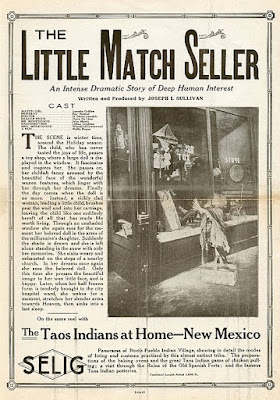Most literary criticism is awful. Don’t get me started on Hamlet’s supposed “indecision.”
Most of it is based on the current fashionable academic theory, Marxism or Freudianism or Jungianism or intersectionality, and not at all on real world concerns like religion and family.
Interpretations of Hans Christian Andersen’s “The Little Match Girl” relentlessly seem to see her problem as poverty. Anderson is supposedly protesting social inequality.
No. It is about child abuse and loveless families. Although we talk about “child abuse” these days, the reality of true child abuse, the loveless family, seems to be the greatest of social taboos. We seem to consistently refuse to see it when it is right before our eyes.
Hamlet being another example…
The little match girl stays out all night and freezes to death not because she is poor. It is not because she cannot afford to go inside and warm herself. She has a home. Granted, “at home it was cold too, for above her she had only the roof, through which the wind whistled, even though the largest cracks were stopped up with straw and rags.” But that is better than the street, and there is no reason to suppose there would be no wood or straw there to make a fire. Certainly, had she gone home, she would not have died of hypothermia.
She cannot go home because “from her father she would certainly get blows” for not selling any matches.
Note too that, when she does not come home, her father or mother do not come out and look for her. And she can assume they will not. The point is not even the blows—it is rejection.
There is no indication that her grandmother had more money than her parents, and this is not mentioned as a consideration. Had she, wouldn’t her parents have inherited it? The significance of her grandmother is not that she will feed and warm the little girl, but that she was “the only person who had loved her.”
And the grandmother’s love matters to her more than the roast goose or the warm fire: “Oh, take me with you! You go away when the match burns out; you vanish like the warm stove, like the delicious roast goose, and like the magnificent Christmas tree!" She is asking for her grandmother’s company, not for the other three.
When they find her corpse, people suppose she had lit the matches to warm herself. “No one had the slightest suspicion …” In other words, physical warmth was not the issue. The cold itself was a metaphor for the emotional coldness she had experienced throughout her young life. Only a crass materialist could see otherwise.
The most telling element in the story is this: “One slipper was nowhere to be found; the other had been laid hold of by an urchin, and off he ran with it; he thought it would do capitally for a cradle when he some day or other should have children himself.”
This is a detail unnecessary to the narrative. Both slippers might as easily have been lost in the snow, as one was. It superficially makes no sense, as a slipper would be too small to use as a cradle.
When we see an anomalous detail like this, we should take it as symbolic.
The street urchin contrasts with the match girl’s father. Although he himself has nothing, no parents, no parental love, his first thought is to provide not for himself but for an imaginary child. And we know children think like this; we are all born with the maternal or paternal instinct.
Which speaks in condemnation of the match girl’s parents. Her father expects her to provide for him. She does not have shoes, while her mother has slippers.
The frustrating thing about creative writing is that, while it seems to be the only way one is allowed to tell the truth, it hardly matters. Whatever you write will be misinterpreted.
Let he who has ears to hear, hear. Let she who has eyes to see, see.













No comments:
Post a Comment